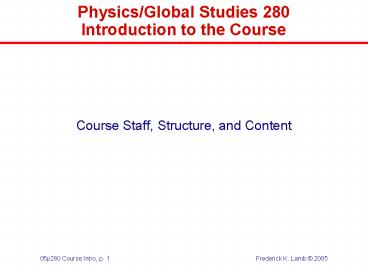PhysicsGlobal Studies 280 Introduction to the Course PowerPoint PPT Presentation
1 / 13
Title: PhysicsGlobal Studies 280 Introduction to the Course
1
Physics/Global Studies 280Introduction to the
Course
- Course Staff, Structure, and Content
2
Introduction of Physics 280 Staff
- Frederick K. Lamb, InstructorProfessor of
Physics and Astronomy - Martin Kalinowski, Senior StaffProfessor of
Nuclear, Plasma, Radiological Engineering - Jurgen Scheffran, Senior StaffResearch
Scientist, ACDIS Program - Christina Furtado, Lead TAPolitical Science
- Duncan Christie, TAPhysics
- Travis Dirks, TA Physics
- David Howell, TAPhysics
- Joseph R. Laracy, TA Computer Engineering
- Radhika Rangaraja, TA Computer Engineering
3
Frederick Lamb 1
- Faculty member at the University of Illinois
since 1970 - Fortner Endowed Chair in Theoretical
Astrophysics, Director of the Center for
Theoretical Astrophysics - Research in high-energy and relativistic
astrophysics - Black holes and strong-field gravity
- Neutron stars, pulsars, and ultradense matter
- X-ray and gamma-ray stars
- Played a leadership role in the conception,
development, launch, and successful operation of
NASAs current Rossi X-ray Timing Explorer
satellite mission - Chair of NASAs Rossi X-ray Timing Explorer
satellite mission planning group
4
Frederick Lamb 2
- Faculty member in the Illinois Program in Arms
Control, Disarmament, and International Security - Consultant to the Department of Energy,
Department of Defense, Arms Control and
Disarmament Agency, and the U.S. Congress
(intelligence and foreign relations) - Consultant to the Institute for Defense Analyses
on arms control, ballistic missile flight,
nuclear weapon tests, space weapons, U.S.
space-launch capabilities, and space and
aerospace vehicles, computerized battle
simulations - Chief expert consultant to the Department of
Defense on verification of limits on underground
nuclear testing - Member, technical support committee for the U.S.
delegation to the 198990 U.S.Soviet
negotiations on nuclear testing - Co-chair, American Physical Society (APS) Study
of Boost-Phase Ballistic Missile Defense,
released July 2003, published 2004
5
Introduction of Other Physics 280 Staff
- Martin Kalinowski, Senior StaffProfessor of
Nuclear, Plasma, Radiological Engineering - Jurgen Scheffran, Senior StaffResearch
Scientist, ACDIS Program - Christina Furtado, Lead TAPolitical Science
- Duncan Christie, TAPhysics
- Travis Dirks, TA Physics
- David Howell, TAPhysics
- Joseph R. Laracy, TA Computer Engineering
- Radhika Rangaraja, TA Computer Engineering
6
Introduction of Some Physics 280 Students
- Name?
- Year in school?
- Major?
- Any background in the subject?
- Why are you taking the course?
- What do you hope for from the course?
7
History of Physics 280
- First offered in Spring 1982
- Course development motivated by concern about the
growing threat of nuclear weapons and nuclear war - Taught by a team of 13 faculty volunteers from
the Physics, Astronomy, and (then) Nuclear
Engineering departments - Second offering in Spring 1983
- Co-taught by Frederick Lamb and Jeremiah Sullivan
- Submitted and approved as a regular course
- Has been taught every spring semester since
- Has served as model for courses elsewhere
- Most courses elsewhere have died off
- Physics 280 is arguably the longest running
course of its kind
8
Course Content
- Introductory lecture
- Nuclear weapon physics and designs
- Nuclear explosionseffects of a single explosion,
of a nuclear war, comparison to effects of
biological, chemical, and radiological weapons - Nuclear weapon delivery systems
- Nuclear weapon programs and arsenals
- Nuclear arms controltreaties and other
approaches to controlling nuclear weapons,
erification technology - Missile defensespast, present, and future
- Conclusions and future directions
9
Structure of the Course 1
- Class meetings
- Lectures (slides posted on Physics 280 website
after each lecture) - Videos, demos, and discussions of readings and
current events - Writing Labs
- Explanation of writing assignments
- Instruction and guidance on how to write for the
course - Help in revising first versions of writings
10
Structure of the Course 2
- Required Books
- The Little, Brown Essential Handbook for Writers,
by Jane E. Aaron - Nuclear Terrorism, by Graham Allison
- The Gravest Danger, by Sidney D. Drell and James
E. Goodby - Reading and Writing Assignments and Guidance
- All will be posted on the course website
- You should check the course website daily
Optional readings and other materials - You are encouraged to read New York Times (NYT)
and other sources of national and international
news about topics related to Physics 280 - You are also encouraged to bring interesting
articles, TV programs, and movies to the
attention of the Instructors
11
Structure of the Course 3
- Physics 280 is an Advanced Composition Course
- Previous credit for a Composition course is an
absolute prerequisite - Even if you already have have Advance Comp
credit, you must do all the writing assignments - Four Required Essays 40 of total course grade
- 1, 2, 3, and 3 pages in length, respectively
- Each must be revised once
- Both versions count equally
- High penalty for late submissions
- Up to two Extra Credit Essays (1.5 pages)
permitted - Up to two Extra Credit Essays (1.5 pages)
permitted - Scores add to total essay score
12
Structure of the Course 4
- Research Paper (30)
- On a topic chosen in consultation with the
instructor - Your proposal must be approved on advance by the
instructor - Your paper must address both technical and policy
aspects of some issue (balance need not be a
5050) - Grades on first and second versions count equally
- An early start is imperative!
- In-Class Mid-Term Exam (10)
- Closed book
- Tests factual knowledge and understanding
- Writing quality not graded
- Scheduled Final Exam (20)
- Closed book
- Tests factual knowledge and understanding
- Writing quality of answers not graded
- Will emphasize material presented after midterm
exam
13
History of Nuclear Weapons
- PBS Video Race for the Superbomb

